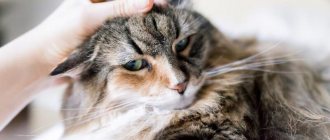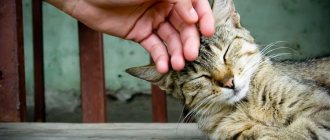Norm or pathology
Sometimes some cats develop mental disorders, but this cannot be detected on their own. For this purpose, it is worth visiting a veterinarian and telling your concerns about changes in the animal’s behavior and the appearance of unmotivated aggression. Only a specialist will be able to determine whether this is related to pathology or is a character trait.
But most often bites are caused by other reasons. Cats are one of the most independent pets and this needs to be taken into account. And everyone's character is different. While some are very affectionate and love attention from their owner, others don’t like it.
Some animals, even living for a long time in a family, try to keep a distance from people and cannot stand a familiar attitude towards their person. These are already individual character traits and it will not be possible to change temperament.
This is the closest point to pressing
Some cats bite and knead when they feel especially cute. They may bite because they feel frisky or simply out of boredom. If so, this may not cause you much concern. However, if they do it too hard, you should stop this behavior.
Your kitten may not understand how hard it is to be too hard. You need to set boundaries by letting them know that they can't bite your face at all. When your cat tries to bite your nose, firmly tell her “no” and keep some distance between the cat and your nose.
© shutterstock
Reasons for unexpected aggression
Cats can bite in different ways. There are two options for this behavior:
- The rarest one is when the pet gently bites its fingers, while the claws are removed and its actions are more pleasant than not. This is what they do most often when communicating with their offspring. When a cat behaves like this with its owner, it means it trusts him and loves him very much.
- More common is a sudden change in behavior. A second ago, the pet took the stroking absolutely calmly, showing no signs of aggression, but now it turned over and began to painfully bite and scratch the hand.
It is important to understand the reasons that motivate cats to bite and scratch their owner's hands. Among the most common are:
Aggression
Often a sign of problems with the pet's socialization. Breeders try to accustom a kitten to stroking in early childhood - up to 7 weeks of age. If this is not done, then in adulthood such an animal will shy away from affection from its owners and bite.
Pain
It is important to remember that cats, like people, are not always healthy; they have stomach, back, head, joint pain, and may have skin problems. Therefore, when showing affection, when something is not right with their health, they can bite. By this they are trying to tell the owner to leave them alone.
If behavior that is not typical appears, you should contact a veterinary clinic for examination, as this may be an indirect sign of illness.
Static electricity
Often, if the animal's fur is too dry and the air humidity is high, microdischarges may form when stroking. A person may not notice this, but it is extremely unpleasant for a pet, so he may bite.
Pet gender
This factor also needs to be taken into account. Many cats are more affectionate, but can be aggressive once they become mothers. Cats are often independent and do not like excessive affection, with the exception of castrated individuals; they begin to show more attention to the owner and demand the same from him.
Increased attention from a person
It must be remembered that these are independent animals that do not like being forced on them. The exception is Oriental cat breeds. Such pets are extremely sociable and loving. But they can also be in a bad mood when affection does not bring pleasure.
Dream
Some cats fall asleep during stroking and, if the rhythm or pressure changes, they may wake up and bite. This behavior is common among poorly socialized pets who always expect trickery from people. Or another situation - the animal is sleeping so soundly that stroking came as a surprise and frightened it. In this case, it is simply a defensive reaction against fear.
Dominant behavior
The cat thus tries to establish himself and show that he is the boss in the house. He tries to control the process of affection on the part of the owner.
Negative experiences in the past
Often people pet their pets before unpleasant procedures, such as nail trimming or bathing. But for them the model is fixed: if they stroked it, something unpleasant happened. And subsequent displays of affection on the part of the owner will provoke biting and scratching.
Early weaning
Cats teach their offspring that a person is a friend, he feeds, caresses and does not cause pain. If you take the kittens away from her too early, they won't recognize it and may perceive people negatively. Pets raised on the street also display a similar pattern of behavior. Cats do not know that their owners are trying to show their love and care in this way, but consider affection a threat to themselves.
Feeding kittens and pregnancy
During this period, some cats may experience a change in character, and in this way they try to protect their offspring and protect them.
Your cat is trying to play
Cats are just stupid. They may chatter and squeak when in play mode. Especially if your cat is small, she may not realize that it hurts or that it is wrong. If you were holding a kitten and it bit you on the nose, it probably didn't mean any harm.
You've just got them all worked up and they're ready to go wild. A slight bite on the nose may not hurt, but you may want to direct it differently. If they make it a habit to playfully bite your nose when you pick them up, they might unintentionally hurt you one day.
When your cat bites your nose, gently apply pressure to his nose and say “no.” They may not react at first, but soon - unless you play along - they will understand. Try not to be too aggressive as this may cause them to attack.
© shutterstock
Cat behavior patterns
Experts have identified several behavioral patterns in cats when they can bite people:
A game
It's always aggression, but like studying or training. The objects are models (rubber ball, artificial mouse, rattle on a string, etc.). For kittens, this is training, learning to hunt, which is certainly accompanied by bites. Therefore, you should not play with your hands or feet with your pets, as they begin to be perceived as a “victim” that needs to be caught and neutralized. When playing with children, at first this behavior is amusing, but this pattern of play will become ingrained in him and in adulthood it will be difficult to wean him off this pattern.
You need to entertain your pets only with the help of special devices for cats.
Host - food
People are a source of food for their pets, so you shouldn’t tease them with food or treats, much less leave it all in a visible place. By biting and scratching, cats try to get their owners to give them another portion of goodies.
Licking the owner's hand - biting
Often people who keep a cat at home are surprised by this pattern: the pet was just purring and licking its fingers and suddenly bit. There may be several reasons for this behavior. For example, unrealized maternal instinct. When licking their offspring, cats may bite. Or it could be a sudden change in the animal's mood. Thus, the pet wants to say that he is tired of affection and needs to be left alone. To prevent such incidents, it is important to pay attention to the cat’s body language and notice changes in his mood. Thus, twitching of the tail and skin on the back, billowing fur indicate an imminent attack on the owner’s hand.
Resentment
For the most part, cats are not vindictive and do not hold grudges for long. But when the owner does not allow them to play with some object or does not allow them into a certain room, they can get angry and show their dissatisfaction with this by biting. With this behavior, you need to try to switch the pet’s attention to another thing, try to distract it with a game.
Secondary aggression
Cats are very addicting creatures and often after an interesting game with an artificial mouse, the owner, wanting to pet the pet, gets hit on the hand with a clawed paw. This happens because the animal has not calmed down and is still in the process of playing for a little while.
The recipe for this behavior is simple - let the cat calm down a little, and after time has passed, pet it.
Primary aggression
Often, in response to physical punishment, the pet begins to show hostility towards the owner. This is due to the fact that he adopts a human behavior model and enters into a kind of fight. It is important to remember that physical punishment is not the best way to raise cats and should not be used. You should scare him with a loud sound or sprinkle water to stop the attack. Sometimes primary aggression indicates an illness in the pet, so if all other reasons for this behavior are excluded, but if the cat continues to rush at people, you need to take him to a veterinarian for examination.
What to do
If your pet is showing unreasonable aggression, take him to an experienced veterinarian. A detailed examination will help determine whether everything is in order with the baby’s health. He may need urgent treatment.
If the kitten is healthy, then the reason is improper upbringing. The best cure for the remnants of a difficult childhood is love and care. Talk to the kitten in a calm, friendly tone, and do not try to pet him unless he asks. Use as toys something that will bring joy to the baby, but will keep him at a distance: a piece of paper on a string, a fur “mouse”, a pair of woolen socks rolled into a ball.
Why does a cat bite just like that?
For the most part, cats never bite for no reason, but there are situations when people feel as if they are being attacked for no reason. However, this is not the case and there are several factors influencing this behavior, in addition to those described above. These include:
- Changing teeth. Animals, like humans, first grow baby teeth, which are subsequently replaced by permanent teeth. In cats, this period begins at 3-4 months of age. In this case, there may be pain and discomfort in the oral cavity, and they begin to actively bite the owner’s hands. It is important to prevent the pattern of such behavior from becoming established at this point. Otherwise, even an adult animal will continue to gnaw people’s fingers. You need to buy special rubber toys that your pet will scratch his teeth on.
- Sexual desire. During this period, many cats become aggressive. This is easy to notice: they leave marks on the territory of the apartment, scream heart-rendingly and ask to go outside. There are two options for solving the problem: castration and selection of a partner.
- Declaw removal. Currently, this inhumane operation is common in veterinary practice. If after it the pet begins to bite, this indicates either revenge, or that his teeth are the only weapon with which he can stand up for himself and this is what the cat uses.
- Lack of attention from people. If the pet is not played with and petted a lot, a bite is its way to interest the owner. You should devote at least 10 minutes a day to communicate with your pet, and the problem will disappear.
- Lack of care. If the tray is not cleaned or there is a lack of food, the cat tries to let the owner know that it is time to clean up his toilet or feed him.
How to understand when to take up parenting
Some owners are negligent about displays of aggression in their pets, even when they go beyond all limits. But what should a person do when everything is not so obvious? “Yes, the cat sometimes jumps out from around the corner and attacks the legs for no apparent reason, terrorizing the guests. This is the character of our furry animal.” Such an attitude, which at first seems to be a benevolent acceptance of a pet, upon closer examination turns out to be a manifestation of weakness and a subordinate position.
A biting kitten will sooner or later turn into a sharp-toothed big cat
It should be remembered that a cat is, first of all, a predator and he thinks of relationships with the inhabitants of the house in terms of hierarchy. This is especially true for uncastrated cats, which come into fighting condition in the spring. The fight for territory, for resources and for females who still do not come when called is a natural state for a cat, determined by instincts.
Therefore, if you want to see a fluffy ball next to you, consisting of tenderness and purring, then the only advice may be to buy a plush toy. Cats, like all other predators, are constantly fighting for survival, regardless of the conditions in which they find themselves. A certain amount of aggression towards the owner is normal - this is evidence that the cat is healthy and full of strength.
Unfortunately, angel cats who are ready to bring only joy to their owner have not been found in nature.
Since all cats are different, it is up to the owner to understand exactly where the pet crossed the border. There is no point in waiting for the moment when your furry pet turns into a tyrant and won’t let you take a step. In order not to resort to radical measures to calm an adult, it is advisable to educate her from a young age.
Education involves the cat’s perception of the owner’s message. The best place a person can take in relation to a cat is the place of leader of the pack. The leader must be fair and consistent, and his word, in turn, must be law.
If the cat understands in time that you are the “main” in this house, it will be easier to establish mutual understanding with him
Of course, cats are less likely to find their place in the pack compared to the same dogs. Representatives of cats are usually classified as “individualists”. However, your pet must learn that he is in a subordinate position, otherwise frequent showdowns cannot be avoided. If you manage to establish a relationship with a cat at this level, then even the most stubborn and grumpy four-legged friends will not need slippers and newspapers.
How to recognize readiness for an attack
Cats do not bite without warning; it is important to pay attention to the signs before attacking. These include:
- the animal's posture changes;
- the pet’s body tenses, which can be felt when touched;
- the purring suddenly stops;
- ears flatten;
- anger in the gaze, pupils dilate;
- the nature of the sounds produced becomes threatening, for example, rumbling, purring;
- the expression of the muzzle changes from peaceful to angry;
- the tail begins to twitch.
One or a combination of signs indicate that the pet is aggressive, that it has begun to get angry and that it will soon attack a person. You should not ignore them, but it is better to leave the cat alone for a while so that he calms down.
Model five: secondary aggression
Cats are addicting natures. If you hunt, then with all your heart, if you play, then completely immerse yourself in the process.
Exciting game
Even communication with other animals captivates them completely. The animal cannot immediately exit this process. If you stroke even the calmest cat immediately after an active game, you can get a gentle hand with your paw. And the animal is not to blame: it is still overwhelmed with excitement. The same situation arises if you suddenly wake up a cat: when asleep, it instinctively perceives any touch as hostile. In addition, with the help of aggression, the cat makes it clear that any action is unpleasant for her, including the obsessive caresses of the owner.
Advice!
After active games, hunting or communication with other animals, there is no need to insist on affection. It is better to leave your pet alone for a while so that he comes to his senses. You should not wake your cat, especially abruptly. And you don’t need to constantly pester him with caresses either - this is not a toy, but a living creature with its own desires.
How to stop a cat from biting
There are several techniques that can be used to rid your pet of a bad habit and prevent it from developing. These include:
- Proper communication with guests. A kitten should not perceive people as aggressors, so it is worth accustoming it to them from a young age. But it is also important that those who come behave with respect for the pet: do not pick him up if he does not like it, do not throw him up (he may get scared) and do not bother him too much. If an animal has huddled in a corner in front of guests, there is no need to drag it out of its shelter to show off to your friends.
- Your pet should have toys with which he can have fun, but should not play with his hands.
- If a cat bites, you should make a sharp sound and he will let go, as it is unpleasant for him. For example, clap your hands or shout sharply.
- If episodes of aggression have become frequent, and all familiar causes of such behavior have been ruled out, it is worth visiting a veterinarian; the problem may be a pet illness.
- After the bite, show the cat that it is unpleasant. You can ignore requests for a treat or to continue playing.
- It is important for the owner to determine the approximate time during which the pet allows stroking and not to neglect this knowledge.
- In case of frequent bites, you can prepare a container with a spray bottle and spray it on the cat in case of aggression. He will get scared and run away. This will wean him from such behavior.
- Get vaccinated against rabies regularly. Your pet can become infected with this incurable disease and become dangerous to others. Therefore, you should not neglect regular visits to the veterinary clinic.
Your cat can groom you
We see cats grooming each other all the time. If you are "one of them", they will try to court you too. What they're really trying to do is teach you how to take care of yourself.
You may not know it, but your cat knows that she is smarter than you. That's why they try to teach you basic survival skills. Perhaps your cat left a mouse or bird on your porch. They think you're too stupid to hunt yourself, so they try to feed you.
Similar to this mood, your cat will groom you to teach you how to clean yourself - you are a dirty animal. If your cat bites your nose, it may be a routine cleaning. If it hurts, let them know and move on. Although this type of nose-biting likely won't do any harm.
What to do if kittens bite: parenting recommendations
Kittens, like children, need to be raised, only this is done differently. It is important to remember that the sooner you start this process, the more effective it will be.
It is more difficult to retrain an adult animal than a baby. If he bites hard, you need to stop playing and clearly, loudly say “No” and stop interacting with him, ignore him for a while. You can hiss at him after a bite. Another option is possible - to switch attention to something else, for example, a toy, but you cannot give a treat. Otherwise, he will take this as praise and will continue to behave aggressively towards people.
It is important for the owner to pay attention to the pet’s character and favorite places for petting. So, some cats like to be stroked on their bellies, while others categorically cannot stand it and allow themselves to be touched only on their backs.
In any case, it is necessary to find out the cause of aggressive behavior and eliminate the factors leading to it. If you can’t cope on your own, you can seek help from specialists.
1111
Your cat is showing affection
Have you ever been petting your buddy and suddenly he grabs you and gently bites your hand? This action is a complete manifestation of affection. They reciprocate your feelings. You may be holding them and your nose is the closest they can come to reacting to.
If you've ever seen two cats interact with each other, you may have noticed this behavior during grooming. Two cats lying together may lick each other and then bite each other gently. This is a good sign. This means that they are completely relaxed, calm and ready for love.
Scientific point of view
The scientific community has long tried to figure out why cats trample with their paws. In the veterinary field, this phenomenon is called a “milk step.” Scientists note several versions related to why cats trample with their paws.
Childhood memories and attachment
Childhood memories. Little kittens, feeding on breast milk, constantly press their paws on their mother's tummy. When an animal stomps around in one place, this may mean that it involuntarily remembers its childhood and repeats its usual actions. This reason for trampling is supported by the fact that in some cases this process is accompanied by a barely audible smacking sound. At the same time, kittens that were deprived of their mother very early trample more often than other individuals, as if trying to compensate for what they lacked in early childhood.
Attachment to a person. Another version of why cats trample a person with their paws says that they simply have the same bright feelings for their owner as they do for their mother cat. At the same time, the pet may purr.
Genetics and territory marking
Genetics. At that time, when cats were still undomesticated, they were forced to independently arrange a place for themselves to sleep. Trampling the plants with their paws, representatives of the cat family built an impromptu bed. This completely explains why cats trample with their paws.
Data collection. This is one of the most unusual and interesting versions. According to her, cats trample a place to get all the necessary tactile information about it. This is due to the fact that there are a huge number of sensitive receptors on the cat’s pads.
Territory identification. Some veterinarians think that cats have special sweat glands on the pads of their feet. The secretion they secrete has such an elusive odor that only a cat’s nose can smell it. With the help of the cat's paws.
Uplifting mood
A good mood. Cats subtly sense the mood of their owner. If a person is sad about something, the pet encourages and calms him in every possible way. With this “massage” the animal produces a lot of endorphins, so it strives to share them with the person.
Stress relief. Many livestock breeders say that the animal often crumples the sofa and bed without purring. Most often, this behavior is observed after the cat has been offended in some way - deprived of sausage, woken up, driven out of a warm place, scolded, etc. In such situations, trampling on interior items means that the animal is trying to get rid of accumulated stress. As a result, the cat calms down and returns to its owner.
The cat tramples its paws during the mating season, this may mean the beginning of mating games
If the opposite sex is not nearby, the animal focuses on its owner
Expression of gratitude and love. Pet owners talk to them, pet them, play with them, brush them and feed them. The cat does not have the opportunity to express its feelings verbally, so it decides to thank the person by stomping: this is how the pet establishes some kind of non-verbal connection with the owner. When an animal purrs, this is a consequence of its absolute peace.
The main reasons why a cat bites its owner's legs
Improper cat socialization is a common reason why cats bite their feet. This situation conceals the animal’s inability to master the principles of social coexistence. This, in turn, may be the result of the cat being separated from its mother and siblings too early.
If you don’t react to a cat biting your legs, this behavior becomes normal for him.
Early separation of young kittens from their mothers is a fairly common practice, which occurs either due to the unconsciousness of the kitten owner, or due to conscious actions dictated by the desire to get rid of the cubs as quickly as possible.
The problem is that in such situations, kittens do not have the opportunity to learn the principles of social coexistence from their mother.
Below are a few more reasons why a cat throws itself at its owner’s feet.










